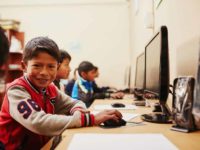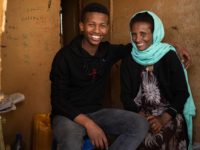The marketplace is alive, buzzing with the hum of shuffling feet and bartering voices. No one is buying housewares today, but down the rows of sellers offering spices, nuts, teas and tobacco is a steady stream of faces and animated exchanges.
Slipping out a back entrance to this outdoor extravaganza, we cross a street of small restaurants and maneuver through a parking lot of buses that will soon head off in every direction that offers a road. Around another corner and up some dusty stairs, we find ourselves among a collection of bright second-story rooms that beam from direct sunlight and the radiant smile of the staff director.
 This is STEP, a small NGO (non-governmental organization) hidden behind a marketplace in Sulaimaniyah, Kurdistan, in northern Iraq. It exists for one purpose: to provide a safe space for young boys who spend their days as sellers in the bazaar.
This is STEP, a small NGO (non-governmental organization) hidden behind a marketplace in Sulaimaniyah, Kurdistan, in northern Iraq. It exists for one purpose: to provide a safe space for young boys who spend their days as sellers in the bazaar.
The director’s grin covers his entire face as he grabs our hands and welcomes our small band of Americans to his country. He proudly shows off his humble surroundings — the artwork of the boys who spend time here, a TV propped up in the corner, a small music room that consists of a little keyboard and a chair, and a space for a tutor and social worker.
We hear the story of STEP:
“Many young children, sometimes as young as 6 or 7, come here to the market to sell something. They start off selling chewing gum or maybe plastic bags. Later they will sell bigger things. Many of them drop out of school. They get tired after a couple of hours of working but don’t have anywhere to go.
“We provide that space. This entire place was built around the design of the kids themselves. They told us what they wanted — a place to get away, a safe place. They write the rules of the center. They draw the artwork. They tell us what they need from the staff.
“We provide a place with adults who can be trusted and who believe that every child is worthy of respect and is just as important as an adult. This is the most important thing, I think. So many people just look down on kids, like they are worth less than an adult. Like they don’t deserve anything.
“But that is not true. Why, I learn something from a child every single day. They are worth just as much as I am. And they need someone to tell them so.”
Then the director shared a little of his story:
“I dropped out of school when I was young. I never went to high school. But I realized after I started working here that I can only ask these kids to do things that I have been willing to do myself. We are a model for them, you know. They watch what we do in addition to what we say.
“So several years ago, I went back to high school. Last year, I graduated. I am over 40 years old, I have a wife and three children, and I just graduated from high school. It was a really hard thing to do.
“But now these kids know that it can be done. That sometimes you have to have the strength to do something that feels embarrassing, because it is the right thing to do. That an education is important. That it doesn’t matter what anyone tells you — you are important, you have skills and abilities, and you need to use them.”
Iraq is a corner of the world that we as Americans are quick to stereotype, but kids and adults are not so different here than they are anywhere else. Children bear the brunt of bad choices. They work early, either out of necessity or because it is culturally more honorable to spend time working than getting an education.
They spend so much time on the streets that they become easy victims of abuse and violence. It is hard for them to find an adult they trust to share their stories with and get help when it is needed.
Here in Kurdistan, one man and a small staff have found their niche. They are reaching out to the working boys of the marketplace to give them a safe haven, get them back into school, and provide counseling and a trusting relationship.
They take this calling so seriously that they change their lifestyles to be better models for these kids, whether that means going back to school, quitting smoking, or a number of other things.
Each of us needs to take seriously the call to be an advocate for children. Kids watch us, and we have a responsibility to model fully the life we encourage them to walk.
I encourage you to find your niche! Identify how you can be an advocate for children, and throw everything you are into that calling. It can change the lives of the children you come in contact with, whether they live in your house, your own neighborhood, or halfway around the world.







7 Comments |Add a comment
That’s awesome, Tracy! Speaking up for children will draw you ever closer to the heart of God, this I can guarantee you…
Very nice job Tiffany! You did a great job on this. Thank for sharing your trip with all, may God Bless You!
Ken
Thanks for sharing this great story. It really sounds encouraging that even in a place so hostile to the truth of Jesus that just one block from the craziness is a safe place for children to be children. Blessings to you.
This is an excellent article. I tried to share on facebook, but got a msg saying it was blocked because it has been reported as inappropriate, abusive or spammy. I wonder why someone would report this. If the problem can be corrected I would like to share! Keep up the good work!
I really hope that these recent posts on Iraq mean that Compassion may begin working there soon! There are so many children there who have been through so much and could use the support of churches who are now free for the first time a) to exist!, and b) to share the love of “Nebi Isa al Messiah” with the Iraqi people!
I am not on staff with Compassion so I can’t speak specifically to your question, but I can tell you that Compassion takes a very prayerful approach to any new country partnership. Among the factors they consider when determining which countries to partner with are the need (we strive to reach the poorest of the poor), the availability of strong local church partners, and the legal covering necessary to do the work. I have been praying for many years now that one day, Compassion would be able to work in the regions of extreme poverty across the Middle East. It is great to hear your heart for this region of the world! Please continue to cover Iraq and the Middle East and all of Compassion’s partner countries with prayer!
Tiffany, I enjoyed reading this! Thanks for sharing your thoughts and experiences. We all need to be reminded of how significant we can be in the lives of all the children we encounter and how seriously we should take that responsibility.